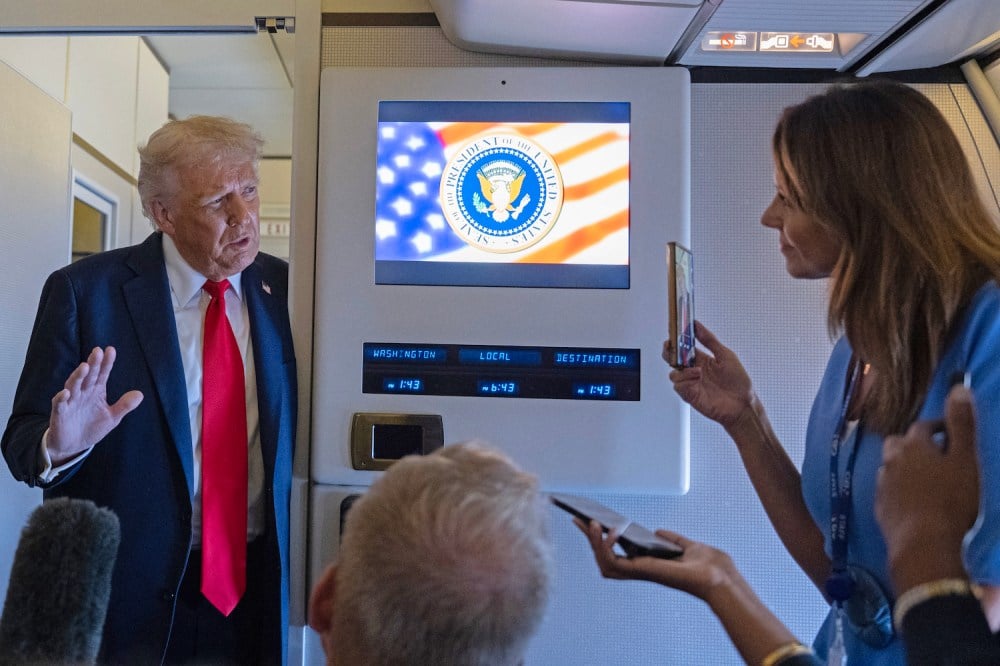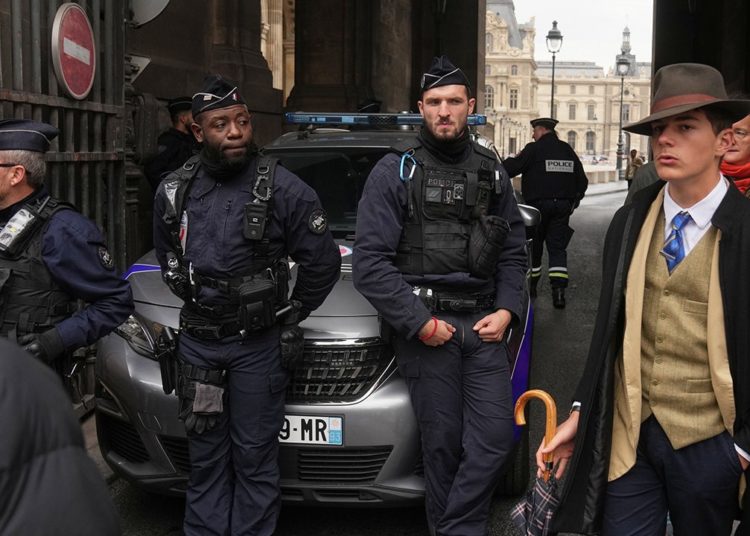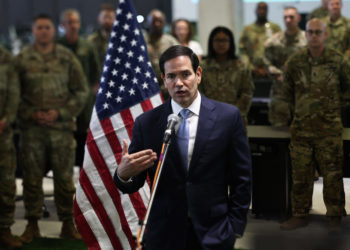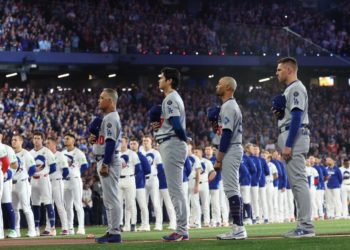Welcome back to World Brief, where we’re looking at a TikTok-focused phone call between U.S. President Donald Trump and Chinese President Xi Jinping, what to watch for at the United Nations General Assembly’s high-level week, and a constitutional referendum in Guinea.
A Win-Win Deal?
In their first phone call since June, U.S. President Donald Trump and Chinese President Xi Jinping haggled on Friday over the final details of a long-anticipated TikTok deal. Although the Chinese ambassador to the United States framed the conversation as “pragmatic, positive and constructive,” neither side walked away with a clear breakthrough.
“We made progress on many very important issues including Trade, Fentanyl, the need to bring the War between Russia and Ukraine to an end, and the approval of the TikTok Deal,” Trump posted on Truth Social. “The call was a very good one,” he wrote, adding that he and Xi “will be speaking again by phone.”
Neither Beijing nor Washington has released further details on the proposed deal. But according to the Wall Street Journal, the arrangement under discussion would see Chinese company ByteDance divest control of TikTok to a new U.S. entity created to operate the app. This consortium of new investors and existing backers would own around 80 percent of the platform, with ByteDance ownership falling below 20 percent to comply with U.S. law. People familiar with the talks told the Journal that it could take weeks for legal concerns to be addressed.
“The Chinese government respects the wishes of the company and is pleased to see businesses conduct commercial negotiations based on market rules to reach a solution that complies with Chinese law and regulations while balancing the interests of all parties,” Xi said, as reported by state news agency Xinhua.
Such a TikTok deal would mark a win for China hawks in the U.S. Congress and the Trump administration, who have expressed fear that the app’s user data could be accessed by the Chinese government, allowing Beijing to monitor Americans’ activity and conduct influence operations. Where Trump himself stands on the issue is more complicated.
The original push to ban the app in the United States came from Trump during his first term in office, with him signing an executive order in 2020 to that effect, citing national security. But legislation forcing ByteDance to divest itself of TikTok or face a ban wasn’t signed into law until 2024, during the Biden administration. In the intervening period, Trump’s reelection campaign began using the platform to connect with younger voters, and Trump seemed to change his views toward the app. Shortly after taking office for his second term, he instructed his Justice Department to suspend enforcement of the ban, a move that he repeatedly extended while trying to come to an arrangement with Beijing.
Beijing has also tried to frame the TikTok deal as a win for Xi. Even though China would be losing control over the popular social media app, experts suggest that Xi would be gaining leverage for future deals with the United States, specifically over Trump’s tariff war and Chinese tech ambitions; China and the United States are negotiating a broader trade agreement focused on curbing fentanyl production and reducing high levies.
“Should ByteDance sell TikTok, China would lose a considerable source of soft power in the United States, but Beijing may see it as advantageous to do Trump such a large favor,” FP’s James Palmer wrote in China Brief. “If I had to bet on who comes out ahead from the trade negotiations, I would slide my chips to China’s side of the table.”
During Friday’s call, Trump and Xi also agreed to hold a face-to-face meeting at the Asia-Pacific Economic Cooperation summit in South Korea, which begins Oct. 31. Trump said he intends to visit China “in the early part of next year” and that Xi will “come to the United States at an appropriate time”; Trump made a state visit to Beijing during his first term in 2017.
Today’s Most Read
- Why Charlie Kirk’s White Nationalism Resonated With Some Nonwhites Abroad by Alejandro Reyes
- How Assassinations Became Normal Again by Stephen M. Walt
- What Is War? Ask an Underwriter. by Elisabeth Braw
What We’re Following
Previewing UNGA. The United Nations General Assembly (UNGA) will kick off its annual high-level week in New York City on Monday. Trump is expected to be the elephant in the room, having traded barbs with many of the world leaders (and historic U.S. allies) convening on Turtle Bay; his U.N. address will take place on Tuesday.
But Trump is not the only person expected to make headlines. All eyes are also on French President Emmanuel Macron, who was the first foreign leader to pledge to recognize an independent Palestinian state at UNGA’s 80th session. Macron will co-host a sidelines gathering on Monday regarding the importance of a two-state solution to the Israeli-Palestinian conflict. In addition to France, Australia, Belgium, Canada, Malta, Portugal, and the United Kingdom are expected to formally recognize Palestine next week.
Also at top of mind for many UNGA participants is Russia’s war against Ukraine, which is well into its fourth year. Peace negotiations remain largely at a standstill, as the United States and Europe fail to agree on how best to pressure Moscow; Trump has argued for putting steep tariffs on countries that purchase Russian oil, whereas European nations prefer sanctions to tariffs and maintain that directly targeting the Kremlin is more effective. Yet, neither strategy may matter if Russian President Vladimir Putin appears uninterested in a diplomatic solution, as outgoing British intelligence chief Richard Moore suggested on Friday.
Want daily updates on UNGA’s biggest headlines? Make sure to subscribe to FP’s Situation Report for on-the-ground scoops and hot mic moments.
Released from captivity. A British couple who had been detained by the Taliban-controlled government in Afghanistan since February was released on Friday following months of Qatari-mediated negotiations. Barbie Reynolds, 76, and husband Peter, 80, had been running education programs in Afghanistan—where they had lived for the past 18 years—when they were arrested by Taliban officials.
According to Afghan Foreign Ministry spokesperson Abdul Qahar Balkhi, the couple was detained after they “violated the laws of Afghanistan,” though he did not provide details as to which laws were broken. The Reynolds are believed to have been held separately during their detention.
“Thank you for giving us our family back,” their son, Jonathan Reynolds, said on Friday, adding that “any longer would have been very detrimental to their health.” Qatar has led several negotiations over the release of foreigners from Afghanistan since the Taliban’s takeover in 2021, including three detained Americans.
Attempted power grab. Guineans will head to the polls on Sunday for a referendum on a new draft constitution that would allow junta leader Mamady Doumbouya to run for president. Doumbouya ousted then-President Alpha Condé in a military coup on Sept. 5, 2021. Upon seizing power, Doumbouya vowed not to run for president when it came time for Guinea to return to civilian rule, which the country was supposed to do by December 2024. Doumbouya’s regime missed that deadline.
The draft constitution would allow junta members to run for office as well as lengthen the presidential term from five to seven years and create a senate, where one-third of its members would be appointed by the president. A simple majority is needed for the referendum to pass. Doumbouya has not publicly said whether he would in fact run for president in the elections, which are expected to be held in December.
But Doumbouya’s government has barred Condé’s Rally of the Guinean People party and the opposition Union of Democratic Forces party from campaigning against the new constitution. Doumbouya claims that this is due to their failure to comply with administrative and financial disclosure requirements; however, critics have described the parties’ suspension as evidence of an attempted power grab.
What in the World?
The U.N. Security Council was expected to vote on Friday on whether to reimpose sanctions on Iran over its nuclear program. Those sanctions, referred to as “snapback sanctions,” were included in the original Iran nuclear deal. When was that deal signed?
A. 2000
B. 2007
C. 2015
D. 2019
Odds and Ends
Eighty-eight years after the death of Czechoslovakia’s founding father, new words of wisdom are coming to light. An envelope (containing another envelope) filled with five pages of handwritten notes by independent Czechoslovakia’s first president, Tomas Garrigue Masaryk, was unveiled on live TV on Friday. In it, historians said Masaryk contemplated his thoughts on dying, having just suffered a stroke; complained about Slovak nationalist politician Andrej Hlinka; and criticized Czechs and the country’s German minority. The notes are believed to date sometime between 1934 and 1937; Masaryk died in September 1937 at age 87.
And the Answer Is…
C. 2015
Trump withdrew the United States from the nuclear deal in 2018. The vote on snapback sanctions comes after Tehran and the International Atomic Energy Agency agreed to a new “framework agreement,” FP’s Keith Johnson reports.
To take the rest of FP’s weekly international news quiz, click here, or sign up to be alerted when a new one is published.
The post Trump, Xi Inch Closer to a TikTok Deal appeared first on Foreign Policy.




